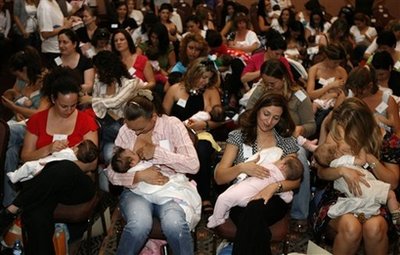Add yet another potential benefit to breast-feeding: Fewer behavioral problems in young children.
Parents of youngsters who were breast-fed as infants were less likely to report that their child had a behavior problem or psychiatric illness during the first five years of life, a new study found.
And the likelihood of mental health issues decreased in proportion to the duration of breast-feeding, meaning that a child who had been breast-fed for a year was less likely to have behavior problems than a child who had been breast-fed for just two months.
"This is an early finding, but it suggests that breast-feeding during infancy could have an effect on behavior during childhood," said the study's lead author, Dr. Katherine Hobbs Knutson, a resident in the department of psychiatry at Massachusetts General Hospital in Boston.
She was to present the findings Wednesday at the American Public Health Association's annual meeting, in San Diego.
|

|
| Mothers are seen breastfeeding their babies during a worldwide breastfeeding event in Nicosia, Cyprus, Oct. 11, 2008. [Agencies] |
Previous research has shown that breast milk offers numerous benefits for babies and that breast-feeding can benefit both mother and infant. Babies who are breast-fed are less likely to suffer from ear infections, diarrhea, pneumonia, wheezing, and bacterial and viral illnesses, according to the American Academy of Pediatrics (AAP). Research has also linked breast-feeding with a reduced risk of obesity, diabetes, sudden infant death syndrome (SIDS) and certain cancers, according to the AAP.
For mothers, breast-feeding helps the uterus quickly return to its pre-pregnancy shape and helps burn additional calories, which can help get rid of extra pregnancy weight, the AAP reports. Additionally, breast-feeding is believed to help nurture the mother-child bond.
The new study reviewed more than 100,000 interviews of parents and guardians of children between the ages of 10 months and 18 years who participated in the National Survey of Children's Health. Parents were asked about breast-feeding and about their child's behavior and mental health.
Examples of questions included: Are you currently concerned a lot, a little or not at all about how your child behaves? How he/she is learning pre-school or school skills? Has a doctor or health professional ever told you that your child has behavioral or conduct problems?
Parents of children who were breast-fed were 15 percent less likely to be concerned about their child's behavior, compared to formula-fed infants. And the breast-fed children were 37 percent less likely to have a medically diagnosed behavioral or conduct problem, according to the study.
And, Knutson said, the effect of breast-feeding appeared to be cumulative, with those who were breast-fed for a longer duration even less likely to have behavior problems.
She also said the study found "a correlation between breast-feeding and cognitive development."
"These findings are certainly intriguing," said Dr. Debra Bogen, a pediatrician in the division of general academic pediatrics at the Children's Hospital of Pittsburgh.
The study adds to the "overwhelming evidence that women should, if they can, offer breast milk to their babies," she added.
Both Bogen and Knutson said the nutritional composition of breast milk might have an effect on the way a baby's brain develops, and that better nutrition could explain the behavioral differences. But both experts felt it was too soon to know for sure the exact cause of the potentially protective effect.
(Agencies via China Daily October 30, 2008)